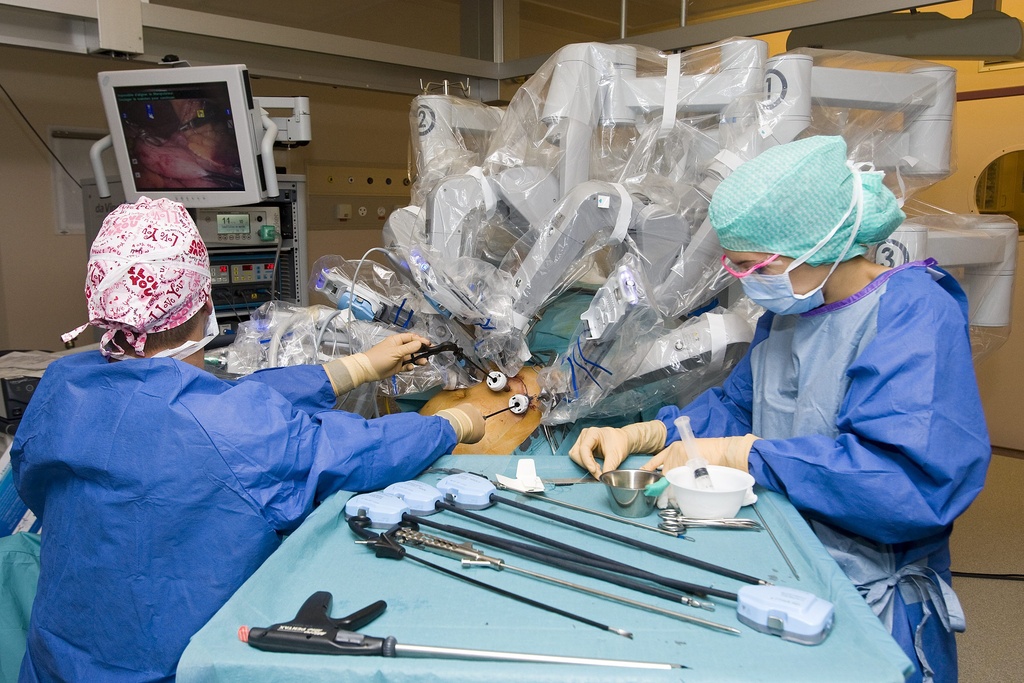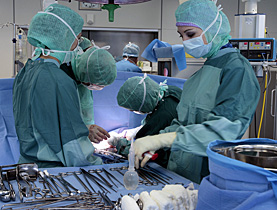Hospitals target wealthy health tourists

Swiss hospitals and clinics are increasingly looking over the border for patients, especially to countries in which the wealthy want high standards of medical care.
Health tourists from Russia and the Middle East are among those attracted to Switzerland to both private clinics and university hospitals. China is a future target.
The number of these patients is on the rise, say those in the hospital sector, even if no exact national figures exist at present.
“There are an estimated 30,000 foreign patients who come to Switzerland every year for medical care, not counting people from the border areas,” said Gregor Frei, who heads Swiss Health. The platform was set up in 2008 by the Swiss trade promotion umbrella organisation, Osec, to promote Swiss healthcare providers abroad.
There are no detailed economic figures either, but Frei says it is possible to make an approximate calculation.
“Medical treatment can cost SFr20,000 ($22,000) a day. This sum can be multiplied five to ten times, taking into account overnight stays in luxury hotels for those accompanying the patient, shopping and other generous expenses.”
“The countries which we are concentrating on at the moment are the Gulf States and Russia: soon we will also include the Far East, especially China.”
Increase visibility
Swiss Health encourages its members to increase their visibility through participation in medical conferences – for example in Saudi Arabia, Russian and Oman – and by collaborating with Swiss embassies, chambers of commerce, foreign health ministers and specialists in the health sector.
The Ars Medica Hospital Group, which has two clinics in the Lugano area in the southern canton of Ticino, is among those with patients from abroad.
“Foreign patients account for more than five per cent of all our customers, a percentage that keeps rising compared with previous years,” said Jérôme Puginier, director of services at the group.
“Our foreign patients mainly come from northern Italy, but for several years the number coming from Russia has been increasing.”
Word of mouth
Ars Medica has a strategy to boost its visibility. “In addition to taking part in conferences and collaboration with foreign doctors who refer their patients, the best advertising is definitely the excellent service,” Puginier said.
“Happy patients will carry out word-of-mouth advertising among their friends and family, which is efficient publicity.”
Rich health tourists come to Switzerland for many sorts of health care, says Swiss Health’s Frei.
“This clientele is looking for top standards across all the medical sectors, and not in any particular discipline,” he said.
Puginier agrees. “It’s difficult to draw up a league table because the pathologies we treat are very diverse: from orthopaedic surgery to gynaecology, as well as obstetrics, neonatal medicine, surgery, internal medicine and oncology. Not forgetting reproductive medicine and cosmetic surgery.”
High quality
There are two types of health tourism, he adds. “There’s one based on getting good value for money and there’s the other based on getting the best quality.”
“As Switzerland is already known for having one of the best health services in the world – excellent care, cutting edge infrastructure, almost total lack of waiting lists – we must nevertheless strengthen this position as a high-level health destination.”
Ars Medica has created a Centre for Preventive Medicine for foreign clients. “The day-long health status assessment includes biological and genetic analysis, diagnostic imaging, functional testing, physiotherapy and dietary consultancy and a final report with personalised recommendations,” explained Puginier.
The basic package – also presented in Russian on the group’s website – costs around SFr3,000.
Public hospitals too
Given spiralling health costs, public hospitals are also turning their attention to this lucrative source of income – those in Zurich, Bern, Basel and Geneva are all members of Swiss Health.
Conrad Engler, from the Swiss Hospital Association, plays down the question of whether these clinics have sufficient infrastructure.
“The decisive argument in attracting patients is Switzerland’s leading-edge services, especially in the university hospitals,” he said.
“Health marketing and other ‘collateral’ aspects are not key influences. What counts is the reputation for quality: for example, the international reputation of the oncologist Franco Cavalli brings patients from all over the world to Ticino.”
Conrad Engler from the Swiss Hospitals Association underlines that, in parallel to Swiss efforts to attract foreign patients, there are also low-cost deals from abroad aimed at Swiss patients.
For example, there are clinics in eastern Europe – Hungary, Bulgaria and Romania – which offer trips which include complex dental treatment at lower prices than in Switzerland.
Other countries, such as Turkey and Thailand, offer cosmetic surgery at competitive rates, adding in holidays as well.
According to a BAK Basel Economics research unit study of 2007, the hospital sector in Switzerland employs 177,100 people directly, equivalent to 4% of the employed population.
This corresponds to around SFr12 billion ($13 billion) in salaries paid each year.
The hospital sector generates a demand for goods and services amounting to SFr6.8 billion – equivalent to a surplus value of SFr3.8 billion – and employs a further 32,000 people.
(Translated from Italian by Isobel Leybold-Johnson)

In compliance with the JTI standards
More: SWI swissinfo.ch certified by the Journalism Trust Initiative













You can find an overview of ongoing debates with our journalists here . Please join us!
If you want to start a conversation about a topic raised in this article or want to report factual errors, email us at english@swissinfo.ch.